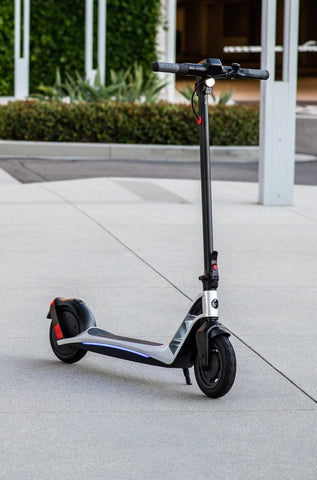Safety Design Parameters of E-Scooters
With the growing population, major cities around the world are facing traffic congestion issues. This congestion coupled with the concern of raising greenhouse gas emissions from fossil fueled vehicles has shifted the focus to battery powered modes of transportation. In these circumstances, electric scooters or simply called as e-scooters have become the preferred mode for personal transportation. In 2019, 86 million trips were made on the scooter – a 100% increase compared to 2018.[1] This growing interest in e-scooters has resulted in designers and engineers work towards a safer, stable and resilient design. The key parameters that influence the safety dynamics of an electric scooter are discussed in this article to help you better understand how our engineers ensure the safety of your commute.
Key design features of an electric bike include:[2]
- Rear tire
- Front Tire
- Deck
- Steering Frame including the handling bar

Important considerations for e-scooter safety design include:
- Handling and Steering
- Gripping and Traction
- Brakes
- Stability and Balance
Keeping these aspects in mind, our e-scooters have been designed with following parameters:
1. Low Centre of Gravity
Center of Gravity is the point where all the forces acting on your electric scooter effectively act. During acceleration, deceleration, turning or braking, the forces act through this point. The position of center of gravity determines the stability of your ride. If it high above the ground, the chances of roll over are enormous as the rotational effect can be higher. Our electric scooters have been designed, just like your favorite Formula One racing cars, to have center of gravity close to the ground. This helps you to perform parking maneuvers without any risk. Turning around corners is easy and without fear of tilting and falling over.[3]
2. Effective Braking
In any vehicle, brakes are an important aspect of safe riding. Stopping your e-scooter in an instant or slowing down gradually, effective brake system is very crucial for your own safety and others on the road. Our electric scooters are equipped with Drum Brakes. These brakes provide more braking force, are low heat generators and better corrosion resistors.[4] These features can lower the chances of accident drastically and ensure a safe, smooth ride.

3. Flat Free Tires
Airless Tires, Non-Pneumatic Tires or Flat Free Tires are solid rubber tires that offer a puncture free ride. Their rubber structure guarantees no air leaking and puncture. This saves maintenance troubles but the paramount advantage of using a solid tire is not worrying about tire blow-outs that can sometime turn into a fatal accident. Our electric scooters are equipped with solid tires because we prioritize the safety of our riders.[5]
4. Wheelbase
Wheelbase is the distance between the front and rear tire. It is another geometrical aspect of the vehicle dynamics that plays significant role in the safety of scooter ride. While a shorter wheelbase may be responsible for quick turning, but it is susceptible to roll over and less stability. For us, the safety of our customers is of paramount importance. Hence, we provide electric scooters with a broad wheelbase that ensures not only comfort of rider but also better stability, aerodynamics and handling and reduced chances of roll over.[6]

5. Wheel Trail
6. Steering Stem Length
This feature of electric scooter determines the handling of your scooter. If the stem length is shorter, it may help in faster steering, but the stability is compromised. However, for longer stem lengths, the steering slow but the stability is enhanced. The extra weight on the front tire diminishes the rolling over possibility. Also, the longer length provides a good suspension effect too.[8]

7. Lights and Reflectors
8. Single Brake Lever

References
[1] N. R. Shah, S. Aryal, Y. Wen, and C. R. Cherry, “Comparison of motor vehicle-involved e-scooter and bicycle crashes using standardized crash typology,” J. Safety Res., vol. 77, pp. 217–228, Jun. 2021, doi: 10.1016/J.JSR.2021.03.005.
[2] “Sci-Hub | Front steering design guidelines formulation for e-scooters considering the influence of sitting and standing riders on self-stability and safety performance. Proceedings of the Institution of Mechanical Engineers, Part D: Journal of Automobile Engineering, 095440702199217 | 10.1177/0954407021992176.” https://sci-hub.se/https://doi.org/10.1177/0954407021992176 (accessed Sep. 17, 2021).
[3] “Explained: How To Measure a Vehicle’s Center-of-Gravity Height.” https://www.caranddriver.com/news/a18201745/explained-how-to-measure-center-of-gravity-height/ (accessed Sep. 17, 2021).
[4] “The Pros and Cons of Drum Brakes | Haynes Manuals.” https://haynes.com/en-us/tips-tutorials/pros-and-cons-cars-drum-brakes (accessed Sep. 17, 2021).
[5] “How to fix a puncture or change a tyre on the M365 Mi Electric Scooter.” https://www.rcgeeks.co.uk/blogs/news/how-to-fix-a-puncture-or-change-a-tyre-on-the-m365-mi-electric-scooter (accessed Sep. 10, 2021).
[6] “Wheelbase: How Important Is It In Designing The Vehicle? - CarBikeTech.” https://carbiketech.com/wheelbase/ (accessed Sep. 17, 2021).
[7] “in my view ...: steering trail.” http://cjeastwd.blogspot.com/2020/04/steering-trail.html (accessed Sep. 17, 2021).
[8] “How does stem length affect a bike’s steering and handling? - CyclingTips.” https://cyclingtips.com/2015/03/how-does-stem-length-affect-a-bikes-steering-and-handling/ (accessed Sep. 17, 2021).


Leave a comment